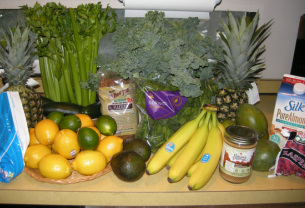
Having plenty of brightly colored fruits and vegetables, fresh fish 1-3 times per week, limit consumption of red meat, avoid excess salt and saturated fats, maintain a healthy weight and keep physically active, limit alcohol consumption, avoid tobacco in any form will help to avoid colon cancer. There are some foods well identified as powerhouses of cancer battling antioxidants and nutrients. These super foods may currently be part of your everyday diet.
Lifestyle modifications include: Maintaining a healthy body weight and exercising to reduce the risk of obesity. Reduction of dietary fat and increased intake of fresh fruit and vegetables and protective omega-3 fats common in fatty fish and canola oil can be helpful. Diet is considered a determinant of increased risk in the development of colorectal cancer. Though it is difficult to ascertain which constituents of diet are most significant in increasing the risk of colorectal cancerous disease, convincing clues proposes a strong association between red beef and fat intake and colorectal cancer. Consumption of animal fat is positively associated with colorectal cancer, while consumption of fatty fish and low fat intake may lower risk. Obesity and lack of physical activity are also associated with an increased risk of colorectal cancer.
Weight Loss: maintaining a healthy diet is important for patients with colorectal cancer in order to withstand the rigors of treatment. A healthy diet includes: protein to maintain muscle mass and repair body tissue, fluids to prevent dehydration, carbohydrates and fats to produce the calories that supply fuel to the body for energy, vitamins and minerals to maintain normal body functioning. Nutritional status is assessed by body weight. Colorectal cancer treatment and side effects that cause weight loss and an unhealthy nutritional status include: diarrhea, nausea, sore mouth and throat and vomiting.
Dietary Modifications:
Patients with colorectal cancer can manage many of the side effects of treatment. As surgery can lead to fluid and electrolyte loss, they can supplement their diet with caffeine and alcohol-free drinks as possible. Sports drinks with electrolytes and liquid supplements such as Carnation boost etc. are also taken. Surgery can also lead to mal-absorption of some vitamins, where patients can add a regular multivitamin supplement to the diet. Patients are encouraged to eat a good variety of foods in order to get all of the necessary nutrients from food rather than from supplements. Folate, calcium and selenium are among the dietary nutrients that offer protection against colon cancer. To alleviate diarrhea, patients should drink clear fluids, consume low fiber, reduced fat nourishment, and bypass hefty, greasy nourishment, raw fruits and vegetables, strong flavors and caffeine.
All of the nutritional recommendations for patients who have completed colorectal cancer treatment are the opposite of what is recommended for patients during treatment. Throughout treatment diet is dictated to a great extent by the side effects a patient experiences and after treatment they now need to follow eating patterns that will maintain good health and prevent cancer and other chronic disease.
Both diet and exercise enhance the body's protecting against system, providing a harmful natural environment for cancer units. Diet and nutrition also play a part in complementary and alternate medicine. In addition to monitoring diet, palliative care may furthermore be helpful to alleviate pain and discomfort comprise.
 RSS Feed
RSS Feed